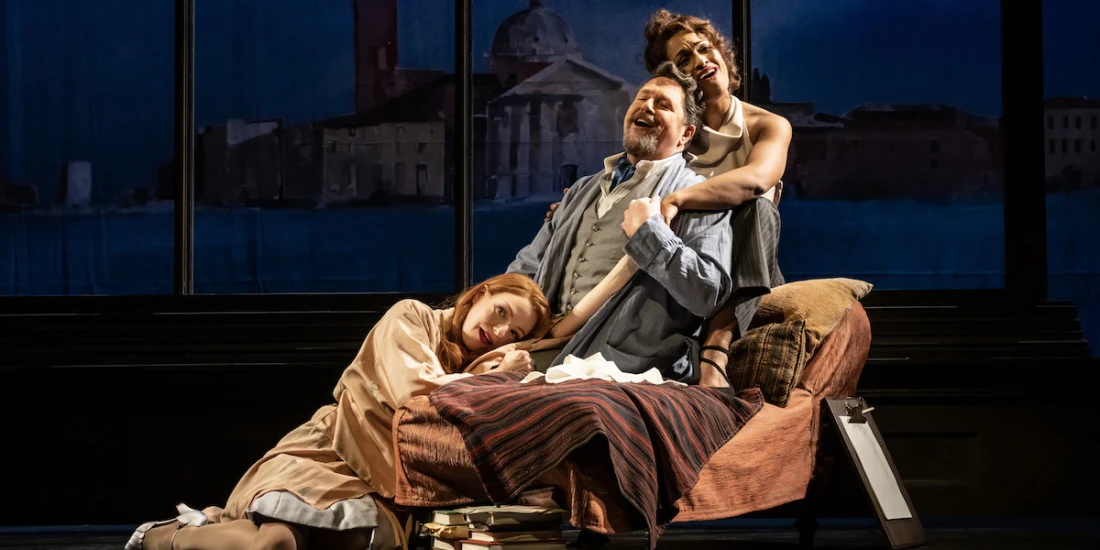'Aspects of Love' review – Michael Ball leads an inescapably dated Lloyd Webber revival
Read our three-star review of Aspects of Love, starring Michael Ball, now in performances at the Lyric Theatre in the West End through 11 November.
Is Andrew Lloyd Webber’s 1989 musical about libido-driven bohemians fit for purpose in 2023? That’s the big question asked by this lavish West End revival of Aspects of Love, in which changes have been made to the score, book and lyrics (by Don Black and Charles Hart). And yet much has stayed the same, too, for better or worse.
The show is once again led by Michael Ball, who made his name with Aspects (and its chart-topper “Love Changes Everything”). He’s now graduated from playing young romantic Alex to inhabiting – with evident enjoyment – Alex’s suave, cultured uncle George. The two men are rivals for the affections of actress Rose, who gets entangled with them in post-war France; George also has an Italian sculptor mistress, Giulietta.
It only gets more incestuous from there. In the second half, Rose’s daughter Jenny falls for Alex – who is technically her cousin, as well as her mother’s former lover. This production has addressed a major concern with the material (based on Bloomsbury group member David Garnett’s 1955 novella) by ageing up the characters, so Jenny is now 18 when she declares her love instead of the extremely problematic 15.
But, even with an assertive performance from Anna Unwin as the older Jenny, it’s all inescapably creepy. Alex is a worldly soldier; Jenny is a sheltered innocent who has barely interacted with anyone outside of her family. She meets Alex when she’s just a girl: in her first appearance on stage (played by a child actor), she’s in pyjamas, chasing a stuffed animal. It’s still essentially grooming.
This is actually a very witty piece – intentionally so. Ball is great value as the vain art forger George, who, when Alex is waving a gun around, is mostly concerned for the safety of his “only genuine Matisse.” There are also wry in-jokes around Rose’s acting career, from the slog of touring to post-show faux-niceties.
However, the musical often becomes unintentionally comical. The audience on my night laughed in horrified disbelief at what should be serious moments, particularly when Jenny tried to convince Alex that they were more than “just cousins,” and at a bizarrely tasteless line from Alex immediately following a tragedy.
The sung-through format also causes problems. Some lines sound poetic and meaningful in song; others just sound parodic. I don’t think anyone could pull off a warbled “Do you still like omelettes?” with a straight face, and the ickier sentiments are magnified; see Rose telling Alex how he differs from his uncle in bed: “He takes his time, unlike you.”
But just what, exactly, is the tone meant to be here? Lloyd Webber’s characters do have some self-awareness, admitting that their lives are ridiculously dramatic. However, it’s jarring to go from a relatively grounded scene to someone pulling a gun, or fainting, or getting off with a lover’s relative, or wearing someone’s beloved dead wife’s dress – which happens not once but twice.
Still, Ball fans get the pleasure of him singing “Love Changes Everything” – now reallocated to George, which makes sense in terms of the wisdom of the lyrics, if not the placement of the actual number. It comes partway through the first half, when George still has a cavalier attitude to such ideas; surely it would be better for when he’s been transformed by parental love.
Not that the second half is entirely free of it, since this earworm is constantly repeated, along with George’s “Life goes on, love goes free” riff. Tom Kelly’s new orchestrations and an excellent orchestra under Cat Beveridge give the best possible account of Lloyd Webber’s chamber opera-esque score – it’s now spry, intimate and tender – but can’t disguise its looping nature.
Jamie Bogyo brings the required overheated fervour to Alex (who, like Bogyo, is now American), plus a lovely tone in songs like “Seeing is Believing.” Opera star Danielle de Niese gives Giulietta real firepower, but feels wasted in such a small role; it makes you wish that the redraft had included more material for her. The women generally are underserved in a piece with lingering misogyny.
Even so, this revival belongs to the superb Laura Pitt-Pulford. She gives a psychologically astute reading of the flighty Rose, showing how she’s exploring her own identity through each relationship and laying bare the terror of abandonment beneath her seemingly selfish bed-hopping. Her raw performance of “Anything But Lonely” is barnstorming.
The musical was originally conceived as a movie, and that’s apparent in its structure: short scenes, constant time- and location-jumping. Jonathan Kent partly solves that problem via a slick staging with a busy triple-revolve, gorgeous hand-painted backdrops by John Macfarlane, and cinematic wipe-style sliding screens which hasten scene changes. However, the latter features sadly unimaginative projections – like stock footage of Venice canals.
You can certainly admire the efforts made here while also questioning the wisdom of trying to stage such an inexorably dated – albeit occasionally beguiling – piece. But what might have resulted from this talented company putting the same creative and financial resources into a new piece of work? That’s the change we really need to see.
Photo credit: Aspects of Love (Photo by Johan Persson)
Originally published on

